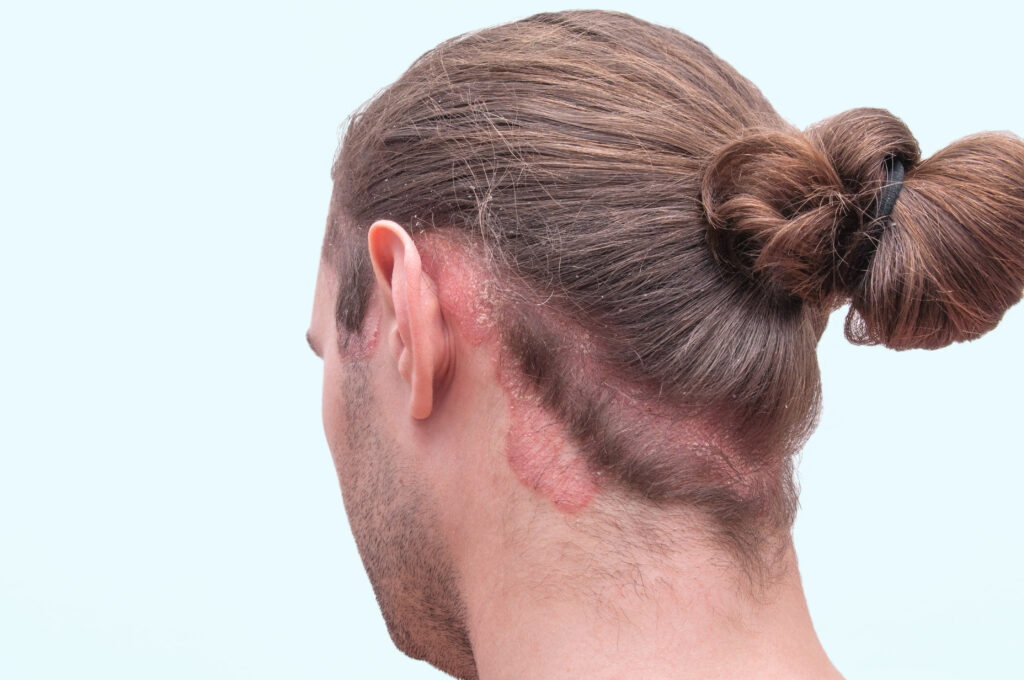
Psoriasis can occur anywhere on the skin, including the scalp. It can look like dandruff, with plaques of thick white or silvery scales. It may also affect the hairline, forehead and ears.
Topical medications, oral medicines and phototherapy can help improve your condition. Your doctor can also recommend dietary changes.
Symptoms
Like other types of psoriasis, scalp psoriasis causes thick, red and scaly patches on your skin. They often look different than dandruff or other irritant scalp conditions and can lead to itching, hair loss, sensitivity and a dry scalp. The scales can bleed and crack. They can also itch and rub off, especially when you brush or comb your hair. Mild scalp psoriasis may involve only small areas, but as it gets worse, the plaques spread to the hairline and onto other parts of your head. People with scalp psoriasis may also have it on their elbows, knees or other places of the body and experience pitting in their fingernails.
There is no cure for scalp psoriasis, but you can control your symptoms with treatment and lifestyle factors. You can avoid some triggers and exacerbating factors such as stress, certain medications, cold weather, itching and smoking. You can also use topical treatments, light therapy or take oral medicines.
Causes
The condition can cause itching and flaking of the scalp. It may be mild and barely noticeable or it can cover the whole scalp with large patches of red, raised, scaly skin that are sometimes covered by crusted scales. Hair loss can occur, but it usually grows back. The scaly areas can crack and bleed. Itching can lead to infections. Scratching can lead to scabs and skin injuries. Treatments can help control symptoms and prevent complications.
It's not known what causes scalp psoriasis or why some people get it and others don't. But it is likely an autoimmune disorder. And many people with scalp psoriasis also have psoriasis on other parts of their body, such as the knees and elbows.
It's important to see a doctor if you have symptoms of scalp psoriasis. Your doctor may be able to tell the difference between scalp psoriasis and seborrheic dermatitis by looking at your scalp. They may also take a skin scrape or do a biopsy.
Diagnosis
In mild cases, scaly patches may look like dandruff or seborrheic dermatitis (a common condition that affects the scalp, hairline, forehead, and behind the ears). During a flare-up, itching may be intense. Sometimes, the skin cracks and bleeds. Scratching makes the problem worse and can lead to permanent hair loss (alopecia).
Your health care provider will ask questions and examine your scalp and other parts of your body. He or she may also take a small sample of skin cells (biopsy) for examination under a microscope to help diagnose psoriasis and rule out other conditions.
Your health care provider can recommend topical treatments, oral medications and phototherapy to treat scalp psoriasis. He or she can also refer you to a rheumatologist to screen for psoriatic arthritis. You may need to try several treatment options before you find one that helps.
Treatment
Scalp psoriasis can look like dry, greasy flakes or thick silvery scales. It can affect only a few patches or cover your entire scalp, forehead and the skin behind and around your ears. It may itch, and you might lose some of your hair.
Psoriasis treatments can help reduce these symptoms. They work by slowing or stopping your skin cells from growing so quickly, or by removing the excess scales. Some treatments include creams and ointments, light therapy (phototherapy) or oral or injectable medications.
Topical treatments can include coal tar, dithranol and a new formulation called calcipotriol. A lotion with a chemical called pidotin or lisanol also can help. These treatments can irritate the skin, so your doctor might recommend that you apply them in a clinic. Dithranol creams are particularly effective in treating scalp psoriasis, but they may stain your clothes, towels and washbasin with purple staining. Lipid-stabilised dithranol, however, reduces staining. Your doctor might also suggest psoralen plus ultraviolet A (PUVA) treatment. You take a pill (psoralen) before you expose your affected skin to UVA light. This more-aggressive treatment consistently improves moderate to severe psoriasis and is often used for scalp psoriasis.




